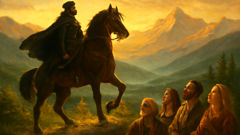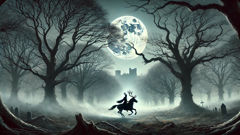Introduction
In the heart of Azerbaijan, where the rugged peaks of the Caucasus Mountains touch the sky and rivers carve ancient paths through wild valleys, tales have always traveled on the wind. Among them, none is more enduring or beloved than the legend of Koroglu. His name echoes across hills and hamlets, chanted by minstrels beneath starlit tents, and whispered in the bustling bazaars from Ganja to Baku. But Koroglu was not born a hero; he was shaped by hardship, injustice, and an unyielding desire to see his people free from tyranny. His story is woven from the fabric of resistance—a tapestry rich with acts of courage, wit, and compassion, stitched together by the hopes of generations. As a young boy, Koroglu witnessed the cruelty of the ruling beys and khans, their greed sowing misery among villagers who toiled endlessly and went hungry. He saw the sorrow etched on his father’s face when their family’s meager lands were seized, their only horse taken as tribute. Yet, in every hardship, Koroglu’s resolve grew stronger. Where others saw only despair, he saw the need for change. Armed first with his father’s wisdom and later with a sword, a steed as fierce as the mountain wind, and the support of loyal companions, Koroglu rose to become a beacon of hope. His story is not merely about stealing from the rich to aid the poor—it is about the spirit that refuses to bow, the laughter that rings in the face of oppression, and the songs that promise brighter days. This is the journey of a man who became legend, whose exploits inspired countless others to stand tall. The legend of Koroglu is, at its core, the story of a people’s resilience and the power of one voice raised boldly against injustice.
The Making of a Hero: Orphan, Outcast, and Outlaw
Koroglu’s earliest memories were marked by loss. Born into a modest family in a mountain village, his father, Ali, had once been the proud keeper of horses for the local bey. But the world turned cold when the bey, suspicious of Ali’s loyalty and eager to break the spirit of the villagers, accused him of theft. Ali’s beloved horses were seized, and he was blinded as punishment—his world turned to darkness overnight. The villagers whispered prayers and curses alike, but none dared oppose the bey’s decree. Young Koroglu’s heart burned with silent fury.
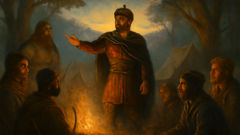
As he grew, Koroglu learned not only the craft of tending horses but also the language of injustice. He listened to his father’s tales—of times when rulers were just, when the land belonged to those who worked it. The lessons etched themselves deep. By adolescence, Koroglu had become adept with bow and sword, his frame honed by labor, his mind sharpened by hardship. Yet, there was more: an indomitable laughter, a spark that could not be crushed by cruelty.
It was during a stormy spring night that fate revealed its path. Koroglu awoke to shouts; soldiers had come to claim the last of his family’s property. Armed with nothing but a staff and his resolve, he fought back. The soldiers mocked him—until one fell, startled by Koroglu’s defiance. His mother pleaded with him to run, to find sanctuary in the wild. With a heavy heart, Koroglu kissed his father’s brow, promising to return when justice was won.
He vanished into the forests that hugged the mountains’ feet, where fugitives and outcasts made their homes. There, among others wronged by the bey’s rule—hunters whose traps were taxed, women whose sons were conscripted—Koroglu found kinship. He learned survival, stealth, and most of all, how to weave many voices into one. The forests became his domain, a living fortress where he was no longer hunted prey but a wily fox impossible to catch.
But Koroglu was not content with mere survival. He fashioned himself a new name—Koroglu, meaning "Son of the Blind"—as a badge of defiance. He recruited followers: Gachag Huseyn, a marksman whose arrows never missed; Nariman, a giant of a man with a gentle soul; and Telli, a cunning woman whose knowledge of herbs and poisons became legend. Their numbers grew, as did their legend. Tales spread of daring raids where the bey’s caravans were ambushed and their spoils distributed among the poor.
Yet, Koroglu was more than a bandit. He understood the power of stories, and each victory became a song sung around village fires. The bey grew desperate, dispatching soldiers, setting bounties. Koroglu countered with wit—leaving messages on the doors of tax collectors, returning stolen goods with notes mocking the khan’s greed. The forests rang with laughter, and for the first time in years, hope began to blossom.
His greatest triumph in those early days came when he liberated a village whose men had been conscripted and its women left to fend for themselves. Disguised as wandering musicians, Koroglu and his band slipped into the village on a festival night. As music filled the air, the soldiers let down their guard. In a whirlwind of movement, the outlaws struck—ropes unfurled, prisoners freed, weapons seized. The villagers rallied behind their mysterious saviors, driving the soldiers away. When dawn broke, the name Koroglu was on every tongue.
Word of the legend reached the bey’s court. Some called Koroglu a demon, others a folk hero. The truth was far simpler: he was a man who refused to accept injustice as fate. The hills became alive with his laughter and the promise that tyranny would not go unchallenged. But for Koroglu, this was only the beginning. For justice demanded not only courage but wisdom—and a heart willing to risk everything for the promise of a better world.
Defying Tyranny: The Daring Raids and Songs of Freedom
Koroglu’s fame swept across the land like wildfire. Village children ran barefoot along mountain paths, singing songs of the fearless outlaw who robbed the rich and restored stolen harvests. Elders nodded knowingly by their hearths, grateful for each act of defiance that made life under the bey’s yoke just a little lighter. But the path Koroglu chose was fraught with danger—for every grateful villager, there was a spy eager to earn a bounty.
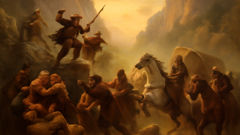
The bey, humiliated by loss after loss, summoned his mightiest warriors. He fortified roads and sent scouts into the forests. Yet Koroglu’s greatest weapon was always his mind. He studied the land, learned every winding path and hidden glen, every river crossing where soldiers might stumble. His horse, Kirat—a steed as legendary as its rider—carried him with the speed and cunning of the wind itself. Together, they became phantoms, appearing where least expected and vanishing before the enemy could draw breath.
One summer, the bey planned a grand caravan, laden with gold and grain extorted from neighboring villages. It was to be an offering to the khan himself. Word reached Koroglu through secret channels: the caravan would pass through the narrow Darband Pass. Under cover of darkness, Koroglu assembled his band. Telli mixed herbs to confuse the guards’ senses, while Gachag Huseyn prepared arrows tipped with sleeping draughts. As dawn painted the cliffs with fire, the ambush began. Rocks rolled from above, blocking escape; arrows flew, silent and swift. The guards tumbled into slumber as Koroglu’s men swept down, freeing prisoners and redistributing the caravan’s bounty. The spoils reached desperate families within days, while the bey’s humiliation became legend.
But Koroglu knew brute force alone would not win the people’s hearts. He understood the power of laughter in the face of tyranny. On moonlit nights, he and his companions would slip into villages to perform satirical plays mocking the khan’s greed. Children giggled at puppet shows where greedy rulers met ridiculous ends; elders wiped tears from their eyes as songs of hope filled the air. The bey’s men would arrive too late—only to find villages echoing with laughter and stories of Koroglu’s latest jest.
Even the beys themselves were not immune to Koroglu’s cunning. One autumn, a rival bey boasted that he would capture Koroglu by laying a trap—inviting him to a feast under the guise of peace. Koroglu accepted, but arrived disguised as a humble bard. He sang so beautifully that even his enemies wept. When he finally revealed himself, he toasted his captors and slipped away amid the confusion, leaving behind only a mocking poem pinned to the door.
Koroglu’s band grew in number and renown. Outcasts found purpose; the poor found protection. The forests became a sanctuary where justice was more than a word—it was a living promise. Yet with every victory, the risks grew. The bey’s vengeance became ever more cruel, and the cost of defiance weighed heavily. Still, Koroglu pressed on, refusing to let fear dictate his fate.
Perhaps the most enduring legacy of these years was not the gold distributed or the soldiers outwitted, but the songs that sprang from every deed. Minstrels traveled from village to village, turning exploits into ballads. Children who had never seen Koroglu dreamed of riding beside him; elders spoke of him as the living spirit of freedom itself. His name became a symbol—a rallying cry that justice could be won if only one dared to stand up.
The bey, driven to despair, offered a king’s ransom for Koroglu’s head. But no one betrayed him. Loyalty ran deeper than fear; gratitude silenced even the hungriest stomachs. Through laughter and courage, through hardship and hope, Koroglu’s legend only grew stronger. And as autumn faded to winter, he prepared for the greatest challenge yet—the battle that would decide not only his fate, but that of all who dreamed of a fairer world.
The Siege of Justice: Betrayal, Sacrifice, and the Birth of Legend
Winter in the Caucasus is a force unto itself—rivers freeze beneath silver ice, and snow-laden pines hush even the boldest laughter. Yet in that season, as the world seemed to slumber, the seeds of rebellion quickened. The bey had grown desperate. His power waned as villagers refused tribute, and even his own men questioned their loyalty. The khan himself demanded results: Koroglu must be destroyed.
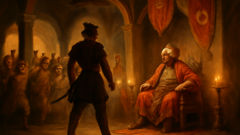
The bey concocted a plan as ruthless as it was cunning. He sent spies to infiltrate Koroglu’s ranks, promising wealth and pardon to any who betrayed their leader. For months, a shadow of suspicion crept through the outlaws’ camp. Whispers carried on the wind; eyes watched every movement. One cold night, as snow fell in heavy silence, betrayal struck. A trusted companion—driven by fear for his family—disclosed the location of Koroglu’s hidden fortress.
At dawn, the mountains erupted with thunder as the bey’s army descended. The siege was brutal—arrows darkened the sky, and battering rams shattered gates forged from ancient oaks. Koroglu’s followers fought valiantly, using every trick and trap learned over years in the wild. Telli slipped through tunnels to rally villagers; Gachag Huseyn picked off attackers from hidden perches. Still, the enemy’s numbers were overwhelming.
As the fortress walls threatened to fall, Koroglu called his closest companions together. His voice, steady and clear, carried hope even as defeat loomed. “We may lose this battle,” he said, “but if our spirit lives, justice cannot die.” With a final embrace for those too wounded to flee, he led a daring escape through secret mountain tunnels.
Their flight was harrowing. Snow blinded them, winds cut like knives, and soldiers hunted them at every turn. Nariman carried the wounded; Telli’s herbs soothed pain and staved off despair. Koroglu rode Kirat at the front, guiding them by starlight and memory. For days they hid in caves, scavenging what little they could. Hunger gnawed at their bellies, but hope burned bright.
Meanwhile, word of the siege spread like wildfire. Villagers rose in defiance—smuggling food to the fugitives, sabotaging the bey’s supplies, refusing to give up the last embers of rebellion. Songs of Koroglu’s courage grew louder, echoing from mountain to valley. Even those who had never met him claimed him as kin.
In the bitterest cold, the outlaws regrouped atop a high ridge overlooking the bey’s palace. The time had come for one final stand. Koroglu’s plan was as bold as it was desperate: under cover of night, they would infiltrate the palace, capture the bey, and force him to sign a decree freeing the villages from his rule.
On a moonless night, wrapped in silence and snow, Koroglu and his companions crept down the mountain. Telli used her skills to slip past guards; Gachag Huseyn’s arrows cut down sentries without a sound. Within the palace walls, chaos erupted as villagers—disguised as servants—rose up alongside them. The bey was cornered in his grand hall, cowering beneath velvet banners.
Koroglu stood before him, eyes burning with years of injustice. “This is not vengeance,” he declared. “This is justice—for every family you have wronged, for every child who went hungry so you might feast.” He pressed a decree into the bey’s trembling hand and forced him to sign. As dawn broke, the villagers poured into the palace square—cheering, weeping, singing songs of freedom.
But victory came at a price. Some companions fell in the siege; others bore wounds that would never heal. And Koroglu, though hailed as a hero, felt the weight of every sacrifice. He knew that justice is not a single act but a torch passed from one generation to the next.
In the years that followed, Koroglu became more legend than man. Some say he vanished into the mountains with Kirat at his side; others claim he wandered the valleys, helping wherever he was needed. What is certain is this: his story lived on. In every song sung by a shepherd, in every story whispered by a grandmother to her grandchildren, Koroglu’s spirit endures—a reminder that one person’s courage can ignite hope in the hearts of many, and that justice, though hard-won, is always worth the fight.
Conclusion
The legend of Koroglu is more than just a tale of adventure—it is a living symbol of Azerbaijan’s enduring spirit. From humble beginnings and bitter injustice, Koroglu rose not only as a fighter but as a unifier and storyteller whose laughter could shake the foundations of tyranny. His courage inspired the powerless to find their voices; his compassion taught that victory means little unless it is shared by all. Across valleys and through generations, his story became a song—one sung by those who refuse to surrender to oppression and who dare to believe in a world built on justice and hope. Today, as fires glow in mountain villages and new challenges arise, the memory of Koroglu rides on every wind: a reminder that heroes are born not from privilege but from resilience, and that sometimes, one person’s stand can light a path for many.

